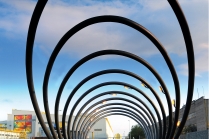News Company / Media
Kyiv Post: Pinchuk launches new steel mill with $ 700 million investment
Pinchuk’s Interpipe, a global top 10 steel pipes and railway wheel producer with most of its factories in Dnipropetrovsk Oblast, said construction of the energy-efficient Dniprostal (Dniprosteel) electric arc steel furnace which first commenced several years ago is winding up.
Company officials said that cold testing – testing of equipment in idle operation – has already started at the Dnipropetrovsk-based steel smelting plant.
“The beginning of these cold tests demonstrates that we have made another step towards the realization of a large-scale project,” said Alexandr Kirichko, general director of Interpipe.
“For our company it is a new step in the testing of equipment. For the country, it is a principally new method of metallurgical production.”
A formal launch is scheduled for March of next year with production levels gradually being churned up to 1.3 million tons of steel per annum by 2014.
Not only does the plant stand out in the nation’s sea of open hearth furnace steelmakers, it also will reduce dependence on increasingly expensive natural gas imports from Russia.
Italy’s Danieli, a leading producer of metallurgic turn-key equipment and technology, was hired in 2007 to build the mill. It will consume eight times less natural gas per metric ton of steel than Soviet-built gas-guzzling steel furnaces.
That’s good news for Pinchuk, considering that Ukraine currently pays about $400 for 1,000 cubic meters of gas imported, up from $95 in January 2006.
But his big capital expenditure into Dniprostal is just a drop in the bucket overall for Ukraine’s metallurgical sector, where a dozen factories churn out between 35 and 40 million tons of steel annually.
The World Steel Association says that electric furnaces account for only 4.5 percent of steel production in Ukraine compared to 44 percent in the European Union and 27 percent in Russia.
Steel produced with basic oxygen furnaces account for 69 percent of steel production in Ukraine while 26 percent is produced using obsolete open hearth furnaces.
And this not only adds to Ukraine’s $10 billion-dollar annual gas import bills, it also reduces the quality and competitiveness of the nation’s steel on global markets.
Interpipe’s cost of producing steel billets using electric arc technology is about $100 per ton less expensive compared to its open hearth furnace, said Oleksandr Makarov, steel analyst at Kyiv-based investment bank Dragon Capital.
“The cost saving…includes 2.2 times lower energy consumption, lower melting loss, and four-fold higher working efficiency,” said Makarov.
Dniprostal will gradually replace an open hearth production facility in Dnipropetrovsk operated by Pinchuk’s Interpipe, reducing dust emissions by 2.5 times. The electric arc furnace will also lower noise levels to municipal levels and reduce industrial waste into the nearby Dnipro River.
The only drawback is access to enough scrap iron, the primary input used in electric arc furnace steelmaking yet not abundantly available in Ukraine.
“This is a major problem,” said Dragon’s Makarov.
The investment bank expects Dniprostal will receive 30-40 percent of its scrap from pipe making subsidiaries. “In addition, Interpipe plans to expand its scrap collecting network by establishing new sites in seven regions.”
Interpipe said that the new mill completes the company’s vertical integration, in turn boosting efficiency and margins.
Pinchuk gained control over a handful of steel pipe factories now consolidated into Interpipe when Leonid Kuchma, his father-in-law, served as Ukraine’s president from 1994 through 2005.
The group expects to generate nearly $2 billion in revenue this year producing 990,000 tons of pipes and 190,000 tons of forged railway wheels.
Sales are largely concentrated in the CIS region, but plans envision that increased efficiency will boost competitiveness, helping it expand business in the U.S., Africa and The Middle East regions.



